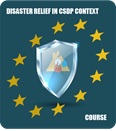Disaster Relief in CSDP Context Course
 Date: (14-07-2026)
Date: (14-07-2026)City: Sofia, Bulgaria
Location: Sofia
Duration: 3 days
Classification: Non-classified
Within the framework of the European Security and Defence College, Crisis Management and Disaster Response Centre of Excellence, together with the Department for Emergency Situation of the Romanian Ministry of Interior and the Diplomatic Institute to the Minister of Foreign Affairs of Bulgaria, in cooperation with the Romanian National College of Home Affairs and the Romanian Diplomatic Institute, are organising the Disaster Relief in CSDP Context Course.
The course will be conducted from 14-16 July 2026 in Sofia, Bulgaria.
Training Audience:
The course is designed for personnel with civilian (diplomatic/consular, police, judicial, intelligence of humanitarian NGOs' staff) and military backgrounds, having expertise and operational experience in civil protection, disaster relief and/or humanitarian assistance. The course is open to participants from Third Countries, with a focus on the participation of experts from the Eastern Partnership countries. The experts from the Common Security and Defense Policy (CSDP) Missions and Operations or those from EU Member States, relevant EU institutions and agencies and the EU Delegations that can be deployed in Fact Finding Missions in disaster stricken areas as teams of EEAS/EUMS or DG ECHO, are encouraged to attend.
Aim:
The aim of the course is to provide basic knowledge about the impact of man-made, natural and climate driven disasters on the European Security (and in particular on conduct of Common Foreign and Security Policy (CFSP)/CSDP. Participants will learn about the EU institutional structures, mechanisms and instruments employed in disaster relief, rescue and humanitarian activities (with emphasis on synchronization of diverse civilian and military CFSP/CSDP assets in disaster response). In the same time, the EU partnerships and cooperation in terms of policies and practices with stakeholders in the field (UN, NATO, leading humanitarian NGO) will also be addressed.
The practical dimension of the course will be accomplished through a syndicate session and a simulation exercise (covering planning templates and learn techniques on how to deal with disasters). Throughout the course, participants will have the opportunity to benefit from the know-how of European institutions and Members States experts and to network and share views with professionals in disaster relief, building on the European security culture.
Learning Objectives:
After finishing the course, students will be able to:
• Describe the place of disaster relief in the whole chain of disaster management (from prevention/preparedness, humanitarian assistance/civilian protection to post-disaster reconstruction);
• Review disaster response/relief through organisation of emergency management systems of the EU, in particular the Union Civil Protection Mechanism;
• Describe the relevance and importance of humanitarian civil-military coordination (CMCoord) in disaster relief.
• Explain the organisation and functioning of the EU humanitarian assistance/relief and civil protection (institutional set - actors, coordination mechanisms and linkages, tools, policies, formal procedures, etc.);
• Review the relevance of EU disaster relief coordination with the UN OCHA, the International Red Cross/Red Crescent and other international humanitarian relief actors;
• Explain the impact of natural, man-made and climate-driven disasters on security;
• Explain the operational emergency relief modalities and scope of the Emergency Response Coordination Centre (ERCC) and the CSDP coordination tools.
• Familiarise with PESCO project driven deployable military disaster relief capability package (DMDRCP), as well as the illustrative scenario support to humanitarian aid and disaster relief;
• Identify the opportunities and challenges of using CSDP assets in humanitarian relief/assistance and post-disaster rehabilitation international operations (critical assets, logistics, transport, communication, medical support, human security);
• Identify strategic context of participation of EU military in disaster management (including civil protection and humanitarian assistance/relief);
• Design possible responses and planning of complex interventions in disaster stricken environments by defining the right mix of policies, instruments and tools to achieve EU’s objectives for disaster relief;
• Produce more effectively integrated action through cooperative problem-solving and teamwork;
• Create an accurate picture of the institutional set-up of the EU and the relevant operating procedures during disaster relief;
• Implement the EU integrated approach to disaster management;
• Analyse and formulate independent and well-informed opinions on EU disaster relief;
• Be able to become part of a shared inter-disciplinary and inter-professional community of experts in the field of disaster management (including the disaster relief).
Methodology:
The course will be conducted as residential event.
The course consists of interactive lectures and practical tasks. Formative assessment will be made and will be monitored by dedicated mentors.
Language:
The command of English language should be at a professional level, according to the criteria stated in STANAG 6001. The minimum STANAG level is: 3-2-3-2 and the minimum civilian equivalent is: B2+/C1 in CEFRL.
Registration:
Mandatory online registration for Bulgarian aplicants should be completed as soon as possible, but no later than 06 Jun 2026. Registration will not be final until confirmed by the ESDC Secretariat . The required minimum for course conduct is 15 participants, and the maximum – 35.
For non-Bulgarian candidates:
The registration is stil open till 12 Jun 2026. Applications from the EU MS and institutions are to be filled out by the national ENLIST nominators via the ESDC secured registration system Enlist (europa.eu) no later than: 12 June 2026. A list with relevant ENLIST nominators can be retrieved from the ESDC website at Nominators - ESDC (europa.eu) .
Applications from other than EU Member States should be sent directly to the ESDC Secretariat at SECRETARIAT-ESDC@eeas.europa.eu, indicating the full name of the candidate (as in official documents used for accessing course venue), the personal e-mail address (functional mailboxes will not be accepted), the institution and the reason how this course benefits the applicant.
Course fee: No course fee
POCs:
- Course Director: Doncho DOYCHEV - doncho.doychev@cmdrcoe.org
Office number: +359 2 92 24 732
- OPR- LTC Mihai ILIE, mihai.ilie@cmdrcoe.org,
Office number: +359 2 92 24 730






